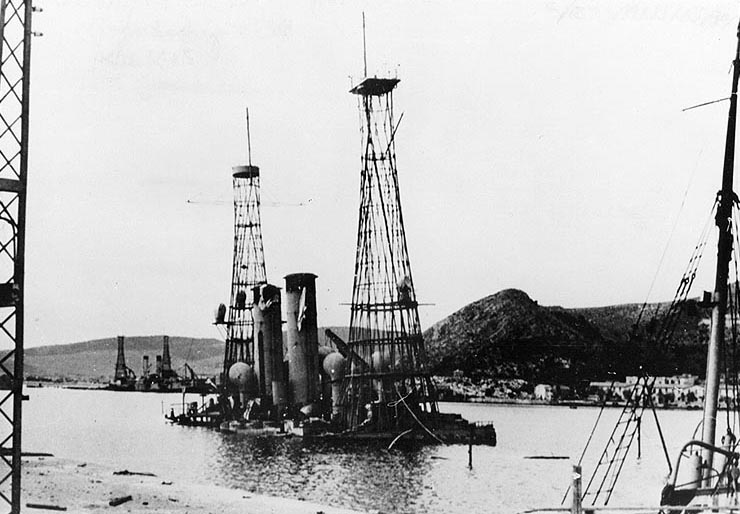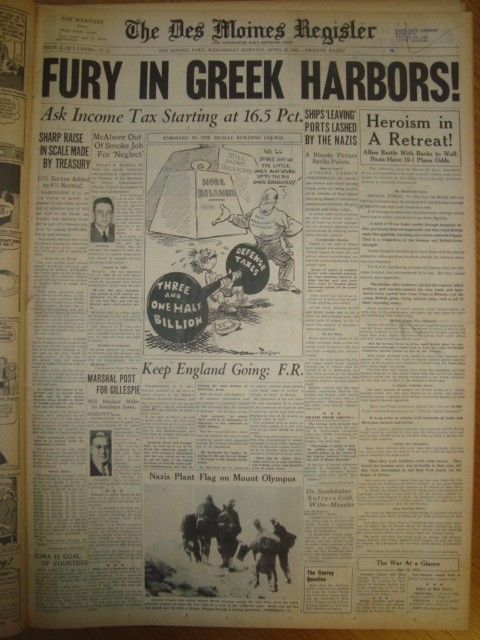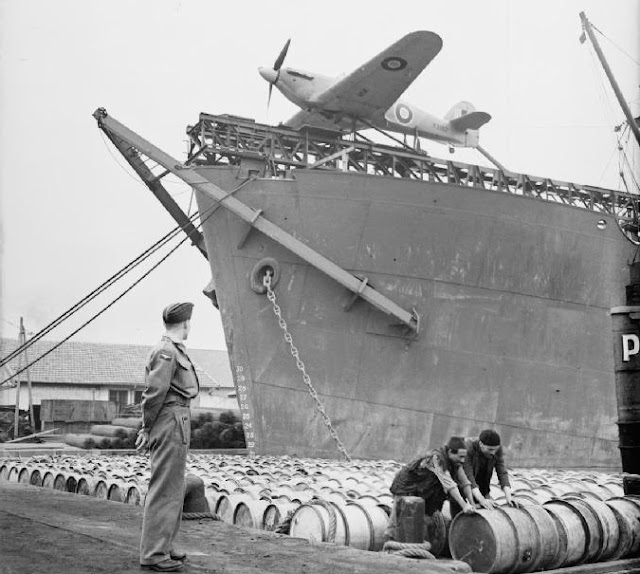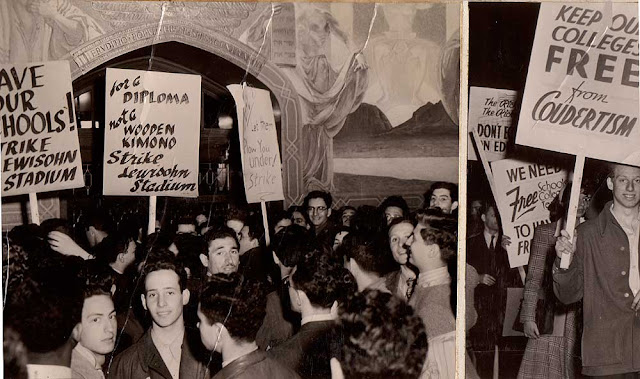Wednesday 23 April 1941
 |
| Greek battleship Kilkis, sunk by the Luftwaffe on 23 April 1941. |
The enemy armies of Epirus and Macedonia have laid down their arms. The surrender was tendered by a Greek military delegation yesterday at 9:04 P.M. to the commander of the Italian Eleventh Army on the Epirus front. The details of the surrender will now be worked out in complete agreement with our German allies.Among other things, Hitler agrees to grant Italy dominion over the new "Independent State of Croatia" despite vociferous opposition from the locals there. However, Hitler retains German control over Serbia, and Foreign Minister Ribbentrop appoints Luftwaffe General Helmut Forster as the new military governor there.
Greek General Papagos, who now has virtually no troops left under his command, resigns.
The Germans have concentrated forces in the vicinity of Ioannina, placed there to prevent any escape by the Greek Epirus Army. With that no longer an issue, the Wehrmacht troops (led by the 1st SS Panzer Division Leibstandarte SS Adolf Hitler, currently of brigade strength) head toward the Ionian coast. Their plan is to block any British evacuation attempts from the Peloponnese, with landings near Corinth by fallschirmjäger (paratroopers). The Bulgarian 2nd Army moves into Thrace.
The British are gearing up for Operation Demon, the evacuation of British troops from the Greek mainland. Some A-lighters arrive off the coast, and the Luftwaffe promptly bombs and damages lighter A.1 off the coast at Megara, causing the crew to scuttle it. Another lighter, A-6, is damaged off Raphtis.
The Luftwaffe continues its depredations against merchant shipping in Greek waters. It sinks the following Greek ships:
- 4665-ton Santa Clara Valley (British), in Nauplia Bay, 7 dead
- 722-ton Assimi at Krioneri
- 372-ton Elvira at Chalkis
- 2398-ton Katerina at Methana
- 1461-ton Kerkyra off Salamis
- 223-ton Kyma in Patras Harbor
- 1839-ton Macedonia north of Patras (some sources place this on the 22nd)
- 625-ton Nicolaos Nomicos north of Patras (later refloated and scrapped by the Germans)
- 4108-ton Nicolaou Georgios at Nauplia
- 385-ton Stathis at Megara
- 231-ton Hydra at Megara
- 273-ton Athina S. at Psathopirgos (later raised)
- 1028-ton Kriti at Antirion (later raised by the Italians)
The RAF is taking a beating in Greece. A Luftwaffe attack on Argos destroys numerous Hurricane fighters on the ground (some sources say up to 13 planes).
Departing King George II, now in Crete, orders that his wine cellar be opened and the bottles given to Allied soldiers. Each enlisted man will receive one bottle, and each officer two.
 |
| The Luftwaffe attacks in Greek waters are echoing across the Atlantic. |
European Air Operations: RAF Bomber Command sends 37 aircraft to attack coastal targets in France and points north during the day. It also raids the port of Brest during the night with 67 planes and sends 14 planes on minelaying operations.
The Luftwaffe continues the "Plymouth Blitz." Tonight, it sends 109 bombers to continue their attacks on the heart of the city.
Luftwaffe ace Hermann-Friedrich Joppien of JG 51, who recently scored his 40th victory against the RAF (and was mentioned in the Wehrmachtbericht), becomes the 11th officer or soldier of the Wehrmacht honored with the Knight's Cross of the Iron Cross with Oak Leaves (Ritterkreuz des Eisernen Kreuzes mit Eichenlaub). He travels to Adolf Hitler's command train Amerika in Austria to receive the medal at the hand of the Fuehrer.
 |
| This photo was taken from a Luftwaffe plane of the attack on Greek battleship Lemnos (with splash) and Kilkis (at the pier in the middle of photo). |
 |
| A CAM ship at Algiers, 1942-43. It carries a Hawker Sea Hurricane Mark I, W9182. The Sea Hurricanes were one-use-only planes, as they did not have pontoons and had to be ditched at sea after a sortie (Wikimedia Commons). |
German raider Thor arrives back at Hamburg, Germany after its 322-day raiding mission. During that mission, Thor sank 11 merchant ships and a British armed merchant cruiser. It also confounded the Royal Navy and kept it searching fruitlessly throughout the South Atlantic without success.
The Kriegsmarine overseas supply network remains intact. Today, German tanker Nordmark supplies Italian submarine Perla, which has been making an arduous journey from Eritrea to France. The Perla is not built for such lengthy cruises, and its sailors have been suffering from lack of supplies for some time.
Convoy OB 314 departs from Liverpool.
 |
| Luftwaffe bombs exploding around Greek battleship Kilkis on 23 April 1941. |
The war in the air over Tobruk is intense, and the Luftwaffe gradually is achieving complete air superiority. Today, German pilots shoot down a Blenheim bomber that is attacking Gazala airfield. The Luftwaffe attacks Tobruk twice, losing two fighters. The RAF force there is not being reinforced, and each loss causes a permanent diminution in its capabilities over the port. RAF losses today are unclear, with different sources placing them at somewhere between 1-7 planes.
Hans-Joachim Marseille scores his 8th kill, a British Hurricane II fighter, over Tobruk. Later in the day, his plane is disabled and he makes a forced landing in German-held territory.
The British 11 Hussars mount a tank raid against German transport in the Fort Capuzzo region. While not resulting in much, the raid reinforces jitters at the Afrika Korps headquarters regarding British attempts to relieve the Australians trapped in Tobruk. The Italian Brescia Division arrives in the operational zone around Tobruk to reinforce the besiegers.
At the OKH headquarters at Zossen, worries about the course of operations in Libya are mounting. Lieutenant General Erwin Rommel has shown a propensity to "dash about" contrary to any orders, and now is requesting additional troops and air cover. OKH Chief-of-Staff General Franz Halder decides to send one of his staff officers, General Friedrich Paulus, to Libya to "correct matters which had got out of hand." General von Manstein turns down the assignment, calling Rommel a "lunatic" and noting that Paulus has a personal friendship with Rommel. Paulus later recalls that he is offered command of the Afrika Korps at this time, but he turns it down because, as his wife counsels, it would be impossible for a general to earn a reputation in North Africa. Instead, he prefers to wait for a command in Operation Barbarossa.
The Luftwaffe also is in action off the Tripoli coast. It bombs corvette HMS Gloxinia, causing some damage from near misses.
Royal Navy destroyers HMS Jaguar, Janus, Jervis, and Juno have been on patrol off the Libyan coast since the 21st. Today, they chance upon 3311-ton Italian armed merchant cruiser Egeo about 150 km off Tripoli and sink it. Fortunately for the Axis, the Egeo is not carrying any troops or freight. The British destroyers fail to notice a large Axis convoy nearby bringing troops to the Afrika Korps, which passes by safely.
At Malta, the Luftwaffe raids continue. The RAF loses a Hurricane during a dogfight off Dellmara, with the pilot making a safe landing in the ocean. A rescue launch is not sent out immediately due to continued enemy air action, and by the time it reaches the vicinity, it cannot find Canadian Flying Officer Henri F Auger, who disappears.
Italian warships lay minefields off Cape Bon, Tunisia. British convoys between Gibraltar and Alexandria have to pass by this promontory.
 |
| The "official" Greek surrender on 23 April 1941 in Salonika. Generals Tsolakaglou, Jodl and Ferrero sign for their respective government. |
Spy Stuff: The "Lucy" spy ring centered in Prague sends Soviet leader Joseph Stalin more warnings about an imminent German attack. As with all the other previous warnings, Stalin discounts this as British propaganda.
Greek/Bulgarian Relations: The Greeks break diplomatic relations with Bulgaria due to the Bulgarian troop movement into Macedonia.
German/Bulgarian Relations: Germany agrees to transfer captured French tanks to the Bulgarian army.
British Military: In a memo to Secretary of State for War David Margeson, Prime Minister Winston Churchill notes that there are "persistent rumors" that the German panzers are being upgraded:
[T]he Germans are constructing tanks with very thick armour - figures of 4"-6" are mentioned. Such armour would be impervious to any existing anti-tank gun or indeed any mobile gun; the tracks and other vulnerable parts are very small targets.Churchill suggests using plastic explosives against such tanks. In fact, the Germans are not at this time building such tanks, though they are upgrading the main guns on their existing Panzer IIIs and IVs.
British Government: Princess Elizabeth - future Queen Elizabeth II - thanks Churchill "for the lovely roses you sent me on my birthday." If there is one thing that Churchill knows how to do better than anyone else, it is to schmooze with the royals.
Australian Government: Prime Minister Robert Menzies, still visiting in London, notes in his diary that he makes a broadcast today to Australia to "stop the rot." There is a loud minority in Australia who are dissatisfied with Australian involvement in the war, or at least with the state of the country's readiness for the conflict.
 |
| At the Fiesta San Antonio, the Magnolia Petroleum Company float features girls seated around the company’s Pegasus logo. April 23, 1941. (San Antonio Light Photograph Collection, MS 359: L-2738-P). |
Holocaust: At Auschwitz, the Germans decide to punish the inmates for an escape attempt. They select 10 prisoners to starve to death in retaliation.
American Homefront: Charles Lindbergh gives an America First speech in New York City before 30,000 attendees. It is the first such rally in New York, which is the heart of President Roosevelt's political base. He argues that "War is not inevitable for this country" but notes that "it is now obvious that England is losing the war." Because of that, he warns that the British:
have one last desperate plan remaining. They hope that they may be able to persuade us to send another American Expeditionary Force to Europe and to share with England militarily as well as financially the fiasco of this war.As with all of Lindbergh's speeches, this one receives a great deal of publicity and stirs debate throughout the country. The Gallup organization releases a poll today which gives survey results to the following question:
If it appears certain that Britain will be defeated unless we use part of our navy to protect ships going to Britain, would you favor or oppose such convoys?The results show that 71% approve, 21% are opposed and 8 have no opinion. However, other recent surveys have shown similar majorities as opposed to direct US military involvement.
 |
| Students protest at City College and Hunter College (right) on 23 April 1941. They are protesting the suspension of faculty members who support the Peace Assembly Committee, a sister organization to the America First Committee (Published in the Daily Worker via City College). |
April 1941
April 2, 1941:Rommel Takes Agedabia
April 3, 1941: Convoy SC-26 Destruction
April 4, 1941: Rommel Takes Benghazi
April 5, 1941: Rommel Rolling
April 6, 1941: Operation Marita
April 7, 1941: Rommel Takes Derna
April 8, 1941: Yugoslavia Crumbling
April 9, 1941: Thessaloniki Falls
April 10, 1941: USS Niblack Attacks
April 11, 1941: Good Friday Raid
April 12, 1941: Belgrade and Bardia Fall
April 13, 1941: Soviet-Japanese Pact
April 14, 1941: King Peter Leaves
April 15, 1941: Flying Tigers
April 16, 1941: Battle of Platamon
April 17, 1941: Yugoslavia Gone
April 18, 1941: Me 262 First Flight
April 19, 1941: London Smashed
April 20, 1941: Hitler's Best Birthday
April 21, 1941: Greek Army Surrenders
April 22, 1941: Pancevo Massacre
April 23, 1941: CAM Ships
April 24, 1941: Battle of Thermopylae
April 25, 1941: Operation Demon
April 26, 1941: Operation Hannibal
April 27, 1941: Athens Falls
April 28, 1941: Hitler Firm about Barbarossa
April 29, 1941: Mainland Greece Falls
April 30, 1941: Rommel Attacks
2020
No comments:
Post a Comment